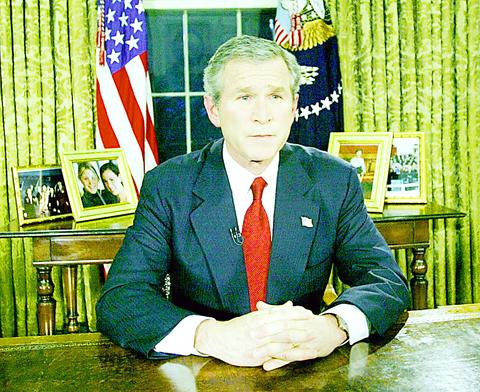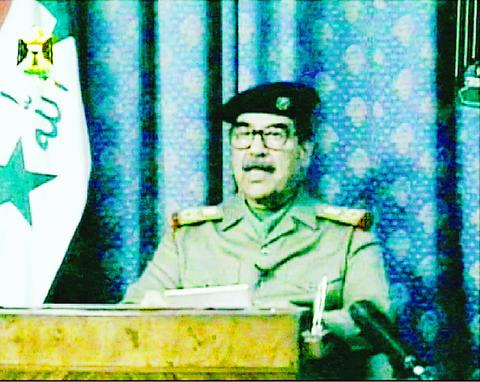US missiles pounded Baghdad yesterday as the US launched a war to topple Iraqi President Saddam Hussein, who retaliated by firing missiles into Kuwait in defiance.
"We will resist the invaders ... The devil will be defeated," Saddam said in an address on state television broadcast three hours after the pre-dawn US attack. It was not clear if the address had been pre-recorded.
US officials said the dawn attack by more than 40 Tomahawk missiles and stealth aircraft, which took even US ally Britain by surprise, was an opportunist hit, aimed to kill Saddam and his entourage, including his sons, Qussay and Uday.

But there was no sign of the mass bombardment Washington had said would mark the first stage in the US-led war to oust Saddam, who is accused of possessing and developing weapons of mass destruction.
Iraqi Information Minister Mohammed Said al-Sahhaf said the US air strikes, described by US President George W. Bush as the start of a war to "disarm Iraq and to free its people," killed one civilian and wounded several others.
The dead civilian had been near the Rotba crossing on the Jordanian border in the west of the country, according to Sahhaf.

PHOTO: REUTERS
The other casualties were hit in a building used by Iraqi state television in al-Anbar province, 100km west of Baghdad.
The minister said strikes near Baghdad were aimed at the Daura suburb in the west of the city.
"The rulers of America are announcing that they are assassins," Sahaf said of the US attempt to kill Saddam.

PHOTO: AP
Clouds of black smoke hung over the Iraqi capital after the missile attack, which came a little more than an hour past the 1am GMT (9am in Taiwan) deadline Bush had given Saddam and his two sons to leave Iraq.
But by mid-morning, life in the city was slowly getting back to normal. Shops and businesses on main avenues remained closed but traffic returned to the roads.
Armed security and police forces were deployed in the city, particularly around government ministries, state buildings, offices of the ruling Baath party and Saddam's various palaces.
Interior Minister Mahmud Thiab al-Ahmad was seen touring the capital but journalists were not allowed to visit the sites targeted by the US missiles.
Wearing a military uniform and black beret, Saddam took to the airwaves to denounce the attack and accuse Bush of "cowardly aggression" in a speech punctuated with historical references to the glory of the Arabs.
He called Bush "the tyrant of the century" and said "the criminal little Bush has committed a crime against humanity," that Iraq would respond to "as part of the fight of the Arab nation against an American-Zionist plot."
Reading slowly from papers, Saddam said there was "no need to remind Iraqis what to do" and declared: "You will be victorious over your enemies, who are covered in opprobrium and ignominy."
Saddam's address was shown on the TV channel run by his elder son Uday, who later called on his Saddam Fedayeen paramilitary volunteer force to be prepared to die as "martyrs" against US-led invaders.
"This is the day that we wanted Iraq's [women] to ululate for us either as victorious heroes or as faithful martyrs," Uday was quoted as saying by the state news agency INA. The "martyrs will fulfill their pledge to God, happy to be the first to become martyrs in the defense of our great Iraq."
More than 250,000 US and British ground troops were massed on the borders of Iraq, in addition to a naval armada and hundreds of warplanes in nearby countries ready to attack.
Britain said an allied thrust into Iraq was imminent after the initial operations earlier in the day.
Several hours after the US raids on Baghdad, a Kuwaiti defense ministry spokesman said an Iraqi Scud and two smaller missiles hit northern Kuwait. US Marines said one missile landed near their desert camp, shared with British troops.
A Kuwaiti defense ministry spokesman said a US Patriot anti-missile defense battery brought down two Iraqi Scuds.
The attacks prompted repeated air raid alerts in jittery Kuwait City and residents rushed into shelters.
But Iraq's information minister was quick to deny that Baghdad had any Scuds, which are banned under 1991 Gulf War ceasefire terms that also ordered Baghdad to scrap its chemical, biological and nuclear weapons programs.
"We do not have any Scud missiles," Sahhaf said, refusing to comment on whether Iraq had shot any missiles at Kuwait.
The US and Britain had originally been pressing for the disarmament of Saddam's regime in line with UN resolutions passed after the first Gulf War in 1991. But they now say that Saddam and the top Iraqi leadership must go.
Immediately after the missile attack, Bush announced in a late-night Oval Office address that war had started.
"On my orders, coalition forces have begun striking selected targets of military importance to undermine Saddam Hussein's ability to wage war. These are opening stages of what will be a broad and concerted campaign," he said.
"To all of the men and women of the United States armed forces now in the Middle East, the peace of a troubled world and the hopes of an oppressed people now depend on you," he said.
He said the war on Iraq may not be as short as he and military planners hope.
"A campaign on the harsh terrain of a nation as large as California could be longer and more difficult than some predict," he said.

The CIA has a message for Chinese government officials worried about their place in Chinese President Xi Jinping’s (習近平) government: Come work with us. The agency released two Mandarin-language videos on social media on Thursday inviting disgruntled officials to contact the CIA. The recruitment videos posted on YouTube and X racked up more than 5 million views combined in their first day. The outreach comes as CIA Director John Ratcliffe has vowed to boost the agency’s use of intelligence from human sources and its focus on China, which has recently targeted US officials with its own espionage operations. The videos are “aimed at

STEADFAST FRIEND: The bills encourage increased Taiwan-US engagement and address China’s distortion of UN Resolution 2758 to isolate Taiwan internationally The Presidential Office yesterday thanked the US House of Representatives for unanimously passing two Taiwan-related bills highlighting its solid support for Taiwan’s democracy and global participation, and for deepening bilateral relations. One of the bills, the Taiwan Assurance Implementation Act, requires the US Department of State to periodically review its guidelines for engagement with Taiwan, and report to the US Congress on the guidelines and plans to lift self-imposed limitations on US-Taiwan engagement. The other bill is the Taiwan International Solidarity Act, which clarifies that UN Resolution 2758 does not address the issue of the representation of Taiwan or its people in

US Indo-Pacific Commander Admiral Samuel Paparo on Friday expressed concern over the rate at which China is diversifying its military exercises, the Financial Times (FT) reported on Saturday. “The rates of change on the depth and breadth of their exercises is the one non-linear effect that I’ve seen in the last year that wakes me up at night or keeps me up at night,” Paparo was quoted by FT as saying while attending the annual Sedona Forum at the McCain Institute in Arizona. Paparo also expressed concern over the speed with which China was expanding its military. While the US

SHIFT: Taiwan’s better-than-expected first-quarter GDP and signs of weakness in the US have driven global capital back to emerging markets, the central bank head said The central bank yesterday blamed market speculation for the steep rise in the local currency, and urged exporters and financial institutions to stay calm and stop panic sell-offs to avoid hurting their own profitability. The nation’s top monetary policymaker said that it would step in, if necessary, to maintain order and stability in the foreign exchange market. The remarks came as the NT dollar yesterday closed up NT$0.919 to NT$30.145 against the US dollar in Taipei trading, after rising as high as NT$29.59 in intraday trading. The local currency has surged 5.85 percent against the greenback over the past two sessions, central